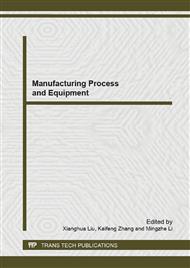[1]
ZHANG Congyu, CHEN Minyou, LUO Ciyong. Power system reactive power optimization based on multi-objective particle swarm algorithm[J]. Power System Protection and Control, 2010 38(20):153-158.
DOI: 10.1109/wcica.2010.5553760
Google Scholar
[2]
YANG Lixi1, GUO Jianyu, CHENG Jie. Power quality evaluation of new rural electrification on D-S evidential theory and AHP[J]. Power System Protection and Control, 2009, 37(14):26-30.
Google Scholar
[3]
QIAN Feng, ZHENG Jianchao, TANG Guangfu. New Approach to Determine Capacity of Dynamic Reactive Power Compensation Using Economic Voltage Difference[J]. Proceedings of the CSEE, 2009, 29(1):1-6.
Google Scholar
[4]
Chattopadhyay D, Chakrabarti B B. Reactive power planning incorporating voltage stability[J]. Electrical Power and Energy Systems, 2002(24):185-200.
DOI: 10.1016/s0142-0615(01)00025-4
Google Scholar
[5]
SU Yi, LE Jian, LIU Kaipei. Design for a novel low-voltage compensation device fit for rural power grid [J]. Automation of Electric Power Systems, 2011, 35(20):88-93.
Google Scholar
[6]
SU Haifeng,ZHANG Jianhua,LIANG Zhirui,ZHANG Shuo,NIU Shengsuo. Substation Life Cycle Cost Planning Based on the GIS Spatial Analysis and Improved PSO Algorithm[J]. Proceeding of the CSEE, 2012, 32(16):92-99.
Google Scholar
[7]
MA Zhongneng, ZHONG Lihua, LU Kai. Study on the maintenance strategy of power equipment based on the optimal life cycle cost[J] Power System Protection and Control, 2011, 29(16):34-39.
Google Scholar
[8]
YIN Laibin, FAN Chunju, CUI Xinqi. Study of switchgear modification based LCC[J]. Power System Protection and Control, 2011, 39(6):61-70.
Google Scholar
[9]
YI Yonghui, WANG Ku, WANG Zhenxue. Research of application schemes of smart substation based on whole-life cycle management[J] Power System Protection and Control, 2010, 38(13):99-103.
Google Scholar
[10]
LIU Lu, CHENG Haozhong, MA Zeliang. Multi-objective Transmission Expansion Planning Considering Life Cycle Cost[J] Proceedings of the CSEE, 2012, 32(22):46-53.
Google Scholar
[11]
YE Yun, WANG Zhuding, ZHANG Zongyi. An estimation method of energy loss for distribution network planning[J]. Power System Protection and Control, 2010, 38(17):82-86.
Google Scholar
[12]
ZHANG Feng, JIANG Daozhuo, HUANG Minxiang. A real-time loss calculation for 10kV distribution based on three-phase distribution monitored data[J]. RELAY, 2003, 31(3):15-19.
Google Scholar
[13]
LIU Jiaqing, ZHANG Hao, ZHANG Jian. Theoretical line loss calculation on medium voltage distribution with dynamic reactive power compensation devices[J]. Power System Protection and Control, 2010, 38(6):92-96.
Google Scholar


